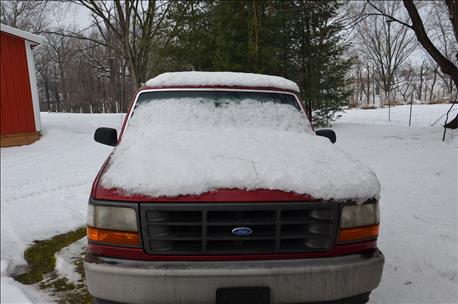
Here is a confession. It wasn't really a pickup that spurred my thinking about this dilemma. What set me off was my garden tractor conking out last night – for the third time this year!
You guessed it if you said it's probably 10 to 15 years old, right in that "keep it or trade it" range. I've played the game every way there is to play it with cars, trucks, and lawn mowers.
Related: Farm Tractors Ain't What They Used To Be
I've concluded that there is no right or wrong way: trade often to decrease the repair bill, and you don't break down but you always have a monthly payment. Keep it to see how far it will go and sooner or later it will nickel and dime you to death.

Keep or trade? Showing a picture of my lawnmower is too painful right now. Here is my truck. It's nearly 30 years old, past the point of no return. I'll keep it!
That's the point of no return – it's worth nothing on trade, of little value to anyone, and you've got so much invested you can't afford to trade it. But it's yours, and you don't have monthly payments, just frequent repair bills. Sound familiar?
Of repair bills and riding lawnmowers
My 13-year-old riding mower has served me well. I mow more than three acres each week. I wait for the dealer's dead-of-winter tune-up special, and let them haul it in and fix it. Usually its maybe $150, no big deal.
It crossed my mind last winter about trading. No, I didn't want a monthly payment for a lawn mower. This time when the tractor came back, the bill was almost as heavy as it was. It needed new "almost everything." The bill was over $500!
Related: Shift in philosophy about trading off used farm tractors
Well, not so bad, factored over years of use. What I didn't realize was that I was on the leading edge of the "nickel and dime" phase.
~~~PAGE_BREAK_HERE~~~
About a month ago I was mowing when suddenly it just stopped. Oh, the tractor engine was humming and the mower was still working, but the tractor wouldn't move.
I decided I would fix it myself. If you're a mechanical klutz, that's not a good idea. An hour at the dealer staring at diagrams with the parts man, a $4 spring and another hour deciding this spring really wasn't my problem, and I called them to come get it.
The culprit was a 90 cent spring, but not the one I thought it was. The bill was over $170.
Hmm…now I've got nearly $700 in it. I kept it to avoid shelling out big bucks, so it was eating away at what I could have spent for a new one.
Two weeks later, I notice a catch in the steering wheel. Before I know it, it's several catches every time I turn. I'm determined I'm going to finish mowing. By then I was mowing in reverse. I couldn't turn it either direction.
I'll trade this money pit! No, I couldn't do that. I already had $700 in it. Now I'm married to it. To save money, I'll haul it in myself. No, I don't have a lawn mower trailer.
Related: Word in the country: It's a buyer's market on used farm machinery
So this morning they picked it up, again. I don't yet know the rest of the story yet, but it won't be cheap.
I could have bought a blue light special for what I'll have in it. I've done that, too. It's good until the mower deck falls apart.
Looks like I'll be driving an expensive mower for a while. And it's only June! My dad would have traded it long ago. My mom would never trade it, even if I had to fix it every week.
I'm somewhere in the middle, in no man's land. If you have a solution to the "keep it or trade it" dilemma,' I could use a magic answer!
Want to know what happens next? Check out the rest of the story: Keep it or trade it? The rest of the lawn mower saga
About the Author(s)
You May Also Like




